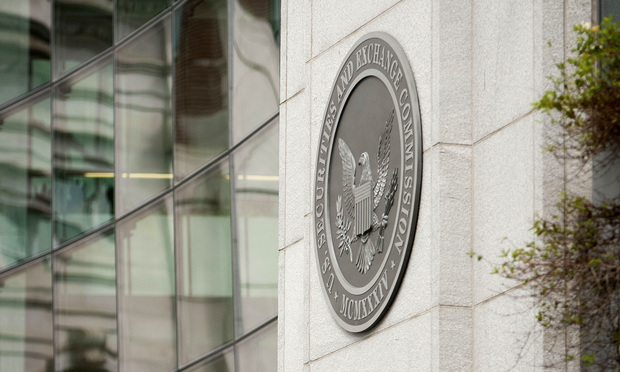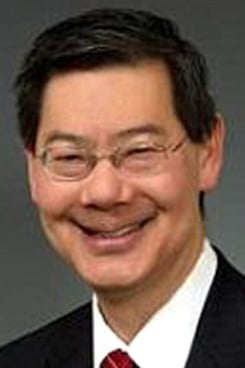 U.S. Securities and Exchange Commission building in Washington, D.C. (Photo: Diego M. Radzinschi/ALM.)
U.S. Securities and Exchange Commission building in Washington, D.C. (Photo: Diego M. Radzinschi/ALM.)
A federal judge in Manhattan on Monday threw out civil securities fraud claims against William Uchimoto—a former partner at Buchanan Ingersoll & Rooney, at Saul Ewing and at Stevens & Lee—who was accused by the Securities and Exchange Commission of misleading Nasdaq.
The agency had sued Uchimoto in connection with a broader probe of investment activities of stock promoter Benjamin Wey, who was known for helping Chinese companies get listed on U.S. stock exchanges through so-called reverse mergers. The SEC alleged that Uchimoto made misstatements while helping two clients of Wey’s company, New York Global Group, obtain Nasdaq listings.
Late Monday, however, Southern District Judge P. Kevin Castel ruled that the SEC’s complaint wasn’t specific enough about Uchimoto’s alleged misstatements, and that the agency hadn’t done enough to allege that Uchimoto benefited from any improper conduct. Castel also dismissed aiding and abetting claims against Uchimoto.
Uchimoto said Tuesday that the SEC cherry-picked certain details to support its claims against him. He said he “did everything absolutely by the book” when communicating with Nasdaq. He also said he felt like a “pawn” that the SEC used to build a stronger case against Wey.
“They gerrymandered what they wanted to look at,” he said.
The judge left intact some or all of the SEC’s case against Wey and four other co-defendants, and gave the agency an opportunity to amend its complaint.
“There are no allegations that support an inference that Uchimoto knew about or was aware of Benjamin Wey’s market manipulation,” Castel wrote. “Nor are there facts alleged that would support an inference that Uchimoto knew or must have known of Benjamin Wey’s false and misleading statements to Nasdaq, the SEC and others.”
Uchimoto has forcefully criticized the SEC since it brought the case in September 2015. He said on Tuesday that he welcomed Castel’s ruling since “it got the job done” in rejecting the agency’s claims.
But the lawyer, who now runs his own practice after leaving Stevens & Lee in early 2015, said he’s still angry about the commission’s approach. Uchimoto said he had filed a motion with the SEC seeking sanctions against the agency and the enforcement division lawyers involved in the case against him. He said that before Monday’s ruling, he had planned to bring the sanctions motion before the court if the SEC didn’t withdraw its claims against him.
“When they screw up, they should be called to the carpet on it,” Uchimoto said. “They committed fraud against me; that’s how I look at it. It’s not even overzealous enforcement. It’s fraud.”
The SEC didn’t immediately respond to a request for comment on Tuesday.
The case, SEC v. Wey, accuses Wey of fraudulently causing companies to be listed on U.S. stock exchanges and of conspiring with others to manipulate stock ownership to their financial benefit. Along with Uchimoto, the co-defendants include another lawyer, Robert Newman of New York’s Newman & Morrison, as well as Wey’s wife and sister and a Swiss financial broker.
The SEC alleged that Uchimoto—a former SEC lawyer and onetime general counsel to the Philadelphia Stock Exchange—played a role in Wey’s scheme by misleading Nasdaq about whether two of Wey’s client companies had the required amount of shareholders to be listed on the exchange. At the time of the alleged conduct in 2008 and 2009, Uchimoto worked at Buchanan Ingersoll as chair of its China practice group.
Uchimoto was represented by Richards Kibbe & Orbe partner Daniel Zinman.
Wey, whose legal troubles have included a sexual harassment case brought by a former intern and defamation lawsuits related to a website he controlled, also faces separate criminal charges in the Southern District that parallel the SEC’s claims. Uchimoto is not a defendant in the criminal case.
Copyright New York Law Journal. All rights reserved. This material may not be published, broadcast, rewritten, or redistributed.
Related Decisions:





